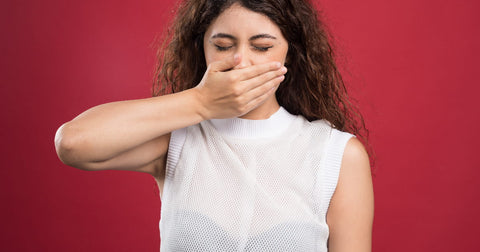Love your morning cup of joe but dreading the bloated aftermath? The question "does coffee make you bloated?" is a common one. While coffee offers a range of potential health benefits, its impact on digestion can be a mixed bag. Let's explore the potential link between coffee and bloating, the factors that contribute to it, and how to enjoy your favorite brew without the discomfort.

Can Coffee Cause Bloating? The Not-So-Simple Answer
The answer is both yes and no. Coffee can indeed trigger bloating in some individuals, but it's not a universal experience. Here's why it's complicated:
- Gut Motility: Coffee acts as a mild stimulant for your digestive system, promoting contractions in your intestines (peristalsis). This increased motility can be helpful for some people, aiding digestion and preventing constipation. However, for others, it can lead to excessive gas production and bloating.
- Acidity: Coffee is naturally acidic, which can irritate the stomach lining and contribute to bloating, particularly in those with pre-existing conditions like acid reflux or gastritis.
- Individual Sensitivity: Everyone's gut reacts differently to caffeine and other compounds in coffee. Some people tolerate it well, while others experience bloating, gas, or even diarrhea.
Drinking Coffee on an Empty Stomach: A Recipe for Bloating?
Yes, for some! Here's why:
- Increased Acid Production: Coffee stimulates the production of stomach acid. When your stomach is empty, this acid can irritate the lining, leading to bloating and discomfort.
- Lack of Buffer: Food acts as a buffer, protecting your stomach lining from the acidic effects of coffee.
Is it Bad to Drink Coffee on an Empty Stomach?

It depends. If you experience bloating or heartburn after drinking coffee on an empty stomach, it's best to switch to drinking it with or after a meal.
Can Coffee Cause Bloating Even if I Don't Have a Sensitive Stomach?
Yes, even those without known digestive issues can experience bloating from coffee. Factors to consider:
- Amount: Excessive amounts of coffee can overwhelm your digestive system, leading to bloating.
- Type of Coffee: Dark roasts and espresso tend to be less acidic than light roasts, potentially reducing the likelihood of bloating.
- Added Ingredients: Sugar, milk, or creamers can contribute to bloating, especially if you're lactose intolerant.
Food Intolerances and Coffee Bloat: The Hidden Connection

If you consistently experience bloating after coffee, a hidden food intolerance could be at play. Sensitivities to coffee beans or common additives like milk or certain sweeteners can trigger inflammation in your gut, worsening discomfort.
Unlock the Mystery: Consider Food Sensitivity Testing
Our Premium Food Intolerance Test Kit can help identify specific foods or ingredients that trigger your symptoms, empowering you to make informed dietary changes and enjoy your coffee without the bloat.
Tips for Beating the Bloat:

- Choose Your Brew Wisely: Opt for low-acid coffee or try cold brew.
- Avoid Empty Stomach Caffeine: Drink your coffee with or after a meal.
- Limit Additives: Use less sugar, milk, or creamers, or choose plant-based alternatives if you're sensitive to dairy.
- Moderation is Key: Don't overdo it on caffeine, even if you tolerate coffee well.
The Takeaway
Coffee can be a delightful part of your daily routine, but it's important to pay attention to how your body reacts. By identifying potential triggers and making smart choices, you can enjoy your coffee without sacrificing your digestive comfort.
Frequently Asked Questions:
1. I get bloated every time I drink coffee. Does that mean I need to give it up?
Not necessarily! While coffee can trigger bloating for some, it's often due to factors like acidity or specific ingredients (milk, sugar). Try switching to low-acid coffee, drinking it with food, or using alternative milk to see if that helps. If bloating persists, consider a food intolerance test to rule out sensitivities.
2. Is it okay to drink coffee on an empty stomach?
It depends on your individual tolerance. For some, coffee on an empty stomach can trigger bloating, heartburn, or indigestion due to its acidity and stimulating effect. If you experience these issues, try having a small snack before your coffee or switching to a less acidic brew.
3. Which type of coffee is less likely to cause bloating?
Dark roasts and cold brew coffee tend to be less acidic than light roasts, potentially reducing the likelihood of bloating. Additionally, avoiding added sugar and dairy can also help minimize discomfort.
4. I'm experiencing bloating after drinking decaf coffee. Is that possible?
Yes, it's possible! Even decaf coffee still contains some caffeine and other compounds that can trigger bloating in sensitive individuals. It might also be a reaction to other ingredients like milk or sugar.
5. Can coffee contribute to long-term digestive problems?
While occasional bloating from coffee is usually harmless, chronic irritation of the gut lining due to coffee's acidity could potentially contribute to issues like gastritis or ulcers in the long run. It's crucial to listen to your body's signals and seek medical advice if your symptoms are persistent or severe.


.png?v=1737390083)
.png?v=1737187409)


